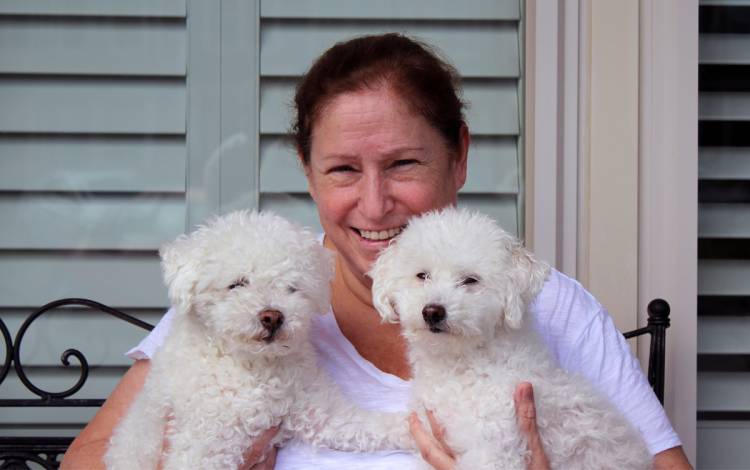The Benefits of Taking Time Off - Even in a Pandemic
Taking vacation, even to stay at home, is rejuvenating; plus, there's a maximum amount of accrued time permitted

With her annual trip to Atlantic Beach on hold because of COVID-19, Jennifer Rumbach consulted her books on North Carolina folklore to create new adventures with her 12-year-old daughter Anya over the summer.
 The mother and daughter journeyed to Gimghoul Castle in Chapel Hill, where legend has it a University of North Carolina at Chapel Hill student dueled over the affections of a woman in the 1800s. They also drove to the Devil’s Tramping Ground in Bear Creek, a barren spot where the Devil supposedly dances, according to Atlas Obscura, a publication of unusual travel locations.
The mother and daughter journeyed to Gimghoul Castle in Chapel Hill, where legend has it a University of North Carolina at Chapel Hill student dueled over the affections of a woman in the 1800s. They also drove to the Devil’s Tramping Ground in Bear Creek, a barren spot where the Devil supposedly dances, according to Atlas Obscura, a publication of unusual travel locations.
“I had to be a little more purposeful for this time off to find out what Anya and I could do while social distancing,” said Rumbach, clinical research communication specialist for Duke Clinical Research Institute. “The staycation was an opportunity to break up the monotony of being at home and spend time away from my desk.”
While taking time off work is a key stress reliever, especially during these trying pandemic times, many of us have curtailed trips and vacation plans. A recent LinkedIn article reports that nearly 70 percent of professionals say they don’t plan to take time off for the rest of the year.
Across Duke University and Duke University Health System, employees took an average of two and a half to three fewer days off between March 1 and July 31, 2020, compared to the same period last year.
Not taking time off to recharge can cause burnout, and actually makes people less creative and productive. And if time off is not used, time off may be lost when the maximum amount of permitted annual accrual has been reached. Additional time cannot be accrued if an individual's accrued time off is already at capacity. That maximum permitted accrual amount varies depending on years of service and whether an employee is at the University or Health System.
 Antwan Lofton, assistant vice president of Staff & Labor Relations in Duke Human Resources, said Duke’s time-off benefit gives employees the flexibility to use vacation time how they see fit, whether it’s for a long trip or an extended weekend to rest and spend time with loved ones.
Antwan Lofton, assistant vice president of Staff & Labor Relations in Duke Human Resources, said Duke’s time-off benefit gives employees the flexibility to use vacation time how they see fit, whether it’s for a long trip or an extended weekend to rest and spend time with loved ones.
“We’re all experiencing more stress because of COVID-19,” Lofton said. “Duke’s time-off benefit is to give you needed work-life balance.”
Taking time off – even to just unwind at home – can be as beneficial as traveling to a vacation destination, said Donna Parrish, a counselor for Duke Personal Assistance Service.
“Many people are facing this relentless 24/7 storm where they’re handling work and meetings, child care, online school and coping with the stress of a pandemic, all in one space,” Parrish said. “Time off is a way to relieve the pressures of balancing it all. It gives you a break.”
Parrish typically recommends time off as a way to improve mental and emotional well-being, a core area of the Healthy Duke initiative. Time off for a safe day trip or a staycation at home can boost your mood as soon as you plan it because it offers something to look forward to during uncertain times.
“You may not be going to some cool exotic place, but relaxing at home still makes a difference. You’re much more pleasant, patient and creative when rested,” Parrish said.
Here are Parrish’s recommendations for unplugging and enjoying a staycation.

- Turn off email and work-related notifications on your phone. Parrish said establishing a work-free zone encourages restorative benefits of taking a day off.
- Do an activity such as solving puzzles, drawing, reading, gardening, walking, biking, baking, spending time with family members and/or pets and eating your favorite takeout. An activity will break-up the monotony of the daily grind to make the day feel special and indulgent.
- Get an extra hour of sleep and have a leisurely start to the day or take a power nap. Doing so distinguishes the day-off from a regular workday.
“I wake up around 7 a.m. on weekdays, so the day already feels special when my alarm goes off at 8 a.m. on my vacation days,” Parrish said. “I’m automatically more at ease because I don’t have a meeting to prepare for or have to rush through my morning routine to be online by a certain time.”
 Caroline Morris, fellowship coordinator for the Duke Graduate School, took five days off since March. Morris visited her sister in Charlottesville, Va. and worked in her cosplay studio in her garage. Cosplay is when participants dress up in homemade costumes as characters from TV shows, movies, comic books and other pieces of pop culture. Morris makes costumes for herself and pieces of outfits for friends, family members and others.
Caroline Morris, fellowship coordinator for the Duke Graduate School, took five days off since March. Morris visited her sister in Charlottesville, Va. and worked in her cosplay studio in her garage. Cosplay is when participants dress up in homemade costumes as characters from TV shows, movies, comic books and other pieces of pop culture. Morris makes costumes for herself and pieces of outfits for friends, family members and others.
A day off for Morris is a respite from the computer and allows her to use her hands to sew, work with hot glue, mold with clay and airbrush to make costumes. This summer, Morris worked on the shinpads, armbands and belt for a Batman costume.
“When I’m taking time off from work, I can rest the analytical side of my brain that I use for analyzing data and financial aid,” Morris said. “That’s important. I come back to work feeling energized and sharp.”
We'd love to hear how you're taking time off during the pandemic. Comment on the Facebook post below to share.
Help share the proactive and extensive work being done by all Duke community members during the COVID-19 outbreak. Send ideas, shout-outs and photographs here or write working@duke.edu.